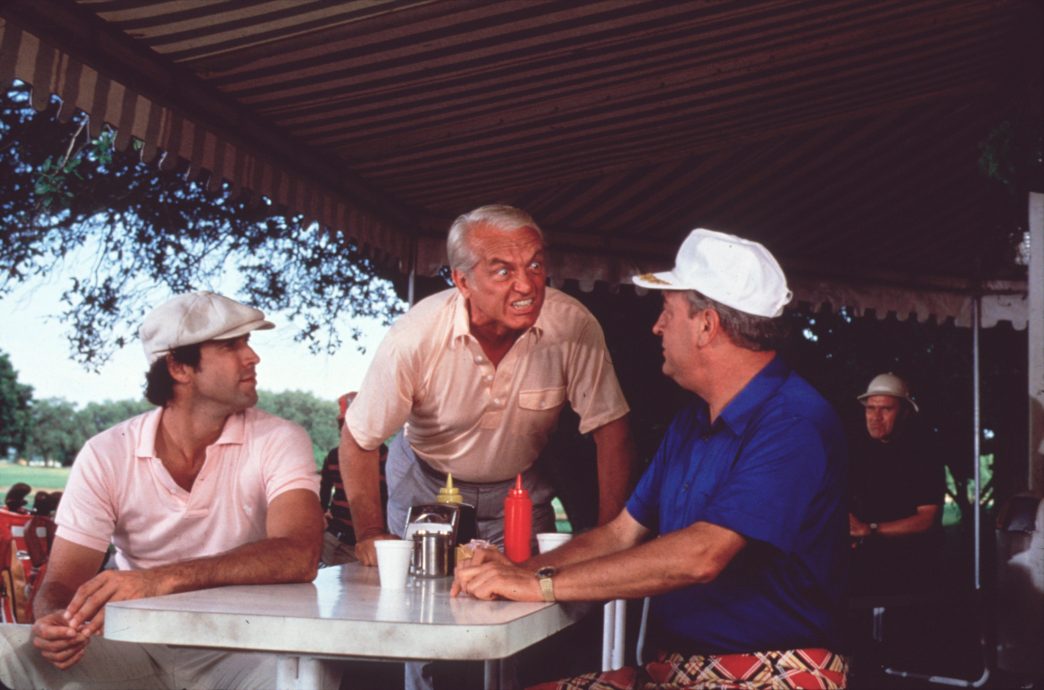If the captain of the ship is unstable, the boat starts rocking even in still waters.
Harold Ramis, Unlikely Prophet of Trump
There was a prophet of Trump in Hollywood in the 1980s. He was Harold Ramis, the most successful writer-director of comedy in his time. You might know him as the man who made Groundhog Day or Animal House. But it’s in Caddyshack, Ghostbusters, and Back To School that Ramis gave us a Trumpian attack on corrupt elites, and protagonists that would be SNL caricatures of Trump if SNL did comedy anymore.
These movies provide strong evidence that we should take our better artists seriously. American art is essentially middlebrow: It brings the high powers of drama to bear on everyday concerns. It offers us a great way to understand ourselves.
Nobody stopped to think these were not just comedies, but also stories about a coming class conflict in America. Everyone thought it was hilarious when Rodney Dangerfield stuck it to the country club snobs and Bill Murray embarrassed the city and federal politicians. Ramis’s themes prefigure our politics and his protagonists foreshadow Trump’s personal political style. Now we’re enacting the politics of those movies, and I don’t see too many people laughing.
First, Caddyshack (1980). Rodney Dangerfield plays a billionaire real estate developer and self-made man—as vulgar and hilarious as Trump, with a similar patter that seems illiterate, but attracts people’s attention and gets his points across. He’s fighting a country club set of WASPs from central casting—they look like the Mitt Romneys of our time—and the comic battleground is a golf club.
Caddyshack displays Ramis’s criticism of WASP elites who neglected society in the name of their unimpeachable character. Their luxuries and privileges isolate them from the lower classes, especially the caddies trying to get ahead in life. How are these kids treated? With unending condescension and the threat of being automated away in favor of golf carts.
Understanding Dangerfield’s character is as important as grasping what he fights over, since he represents a new champion of equality. Like Trump, he likes to insult his adversaries. His shamelessness mostly immunizes him from being insulted in return. This shocks his well-heeled adversaries, who are used to being above reproach and being treated with deference. The story lets us see a lot of corruption among them—but discussing those failings is beyond the pale, much as it is with our own ruling class. They are always defended by a pious lie about their holiness.
Dangerfield is far more at home with the caddies than the club’s old-line membership. He banters and trades insults with them freely. He ostentatiously throws money around on tips—but this display offers a vivid contrast with WASP stinginess. Dangerfield does not reject the people, whereas his adversaries always hold the people at arm’s length.
Back To School (1986) emphasizes this populism even more. Here, Dangerfield ends up leading a populist revolt at a university. He’s an all-American self-made millionaire who earned his fortune selling clothes to fat people. He has a humorous manner and accommodates the people as they are, without requiring much of them. Nevertheless, he wants the best for his son and so he enrolls—to prove college education is worthwhile. But he quickly learns that the place is run by snobs who blithely foment revolt. As the conflict grows, more students, and even some faculty, take Dangerfield’s side and want to see him succeed against the self-appointed aristocracy of the mind.
Again, his insulting manner goes a long way to show up the snobs. The university’s president allows him to enroll because his money will buy a building, but the academic dean decides to find a way to throw him out. Although they take his money, he’s not good enough to be among them. His vulgarity is ideal for bringing out this hypocrisy, as well as criticizing the underlying injustice.
Moreover, the very things the snobs reject endear Dangerfield to many of the students. First, and most importantly, the students are fine with how he made his money. Like Trump, he’s a successful businessman, which matters more to his supporters than lessons on economics from professors. Like Trump, he’s realistic about corruption in America and is proud of dealing with it to get things done. This contrasts sharply with an institutional piety based on denying any immorality or illegalities among its own membership, which therefore can’t stand having these ugly realities pointed out.
Such braggadocio is more grounded than the moralism of the chattering class who never have to face the real problems in America, about which they nevertheless lecture captive audiences. In the movie, that’s students who know they live in America and cannot afford the delusions of academic privilege. Vulgarity in itself is realistic compared to moralism coming from corrupt elites.
The criticism vulgarity makes is that it’s easy to be virtuous when you have everything in the world. How about when prospects are miserable? Our elites may think themselves paragons of virtue—but how have they reacted to Trump’s election? Public-spiritedness and equanimity or histrionic hysteria? Ramis’s vulgar rationalism attacks the distinction between many and few, implying it’s mostly chance that gets the privileged where they are. Easy virtue cannot be publicly defended in a democracy.
Finally, Ghostbusters (1984): A movie about the collapse of New York starting in the 1970s. The ghosts are a symbol of all-encompassing political failure to deal with crime, public health, and poor administration. Who will save this city? Enter Bill Murray! Ramis introduces him faking a psychological experiment to get a woman to have sex with him. He’s a cad and a fraud: But he’s not hiding it. In what world could such a man become a hero? In a world where political and religious leaders are corrupt, incompetent, and super-moralistic, so they allow no criticism of themselves. Welcome to the rise of Trump.
Ramis shows it takes a conman to upend the pretentious, and to help the public see that their “betters” are conmen, too. The film’s prime examples are Mike and Lenny, the canny cardinal and the mayor of New York: Authorities over bodies and souls and doing nothing to save the city. They are, however, masters of press manipulation. Ramis shows us these guys are no better morally than Murray. In a crisis, their primary concern is how it makes them look—as we see with our own politicians, whenever something bad happens, as much in the church as anywhere else. They care about the TV more than about politics. Cynically, but all too knowingly, Murray suggests to the mayor that he must save the people of New York—but only because they’re registered voters.
And beyond these politicians, there’s the embodiment of Progressive politics, Murray’s nemesis—the EPA guy looking to shut down the enterprising ghostbusters. He doesn’t even have the elected politicians’ cynicism to moderate his self-righteous elitism. He really believes his authority is scientific, his expertise unquestionable. And his bouts of outrage alternating with contempt, of course, describe perfectly the attitude of much of our media, academia, and administration. This is a lesson for our times, when we constantly see the very legitimacy of elections questioned, even by people who work for the government and don’t feel particularly bound to obey the laws, if that conflicts with their own self-righteousness.
Ramis shows his skepticism of the ruling class in Ghostbusters in metaphor as well: Why must ghosts attack luxurious hotels? Because the elites are interested only in themselves. It takes a force of nature, which seems supernatural to people who think they’ve mastered nature, to remind them of necessity, of their limits, and of their neediness.
Even now, our anointed should learn from this demotic criticism and change their actions until the caricature no longer looks true to life. Or else unpopularity must doom them. Even if a conman has to do it, someone will point out that America is a democratic republic and the people can withdraw consent to being governed poorly. It’s late, but it’s not too late for elites to learn to show some respect for the people.
Note: The author would like to thank Pete Spiliakos for suggesting some of the ideas behind this article on our podcast.



